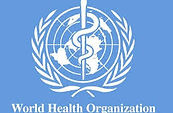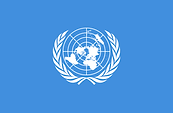

EPACHA.org

Environmental Protection Alliance and Center for Humanitarian Affairs Foundation
"REBUILDING OUR WORLD BLOCK-BY-BLOCK"
T h e P o r t a l s o f E P A C H A F o u n d a t i o n – P h a s e I I a r e O p e n :




2026: The "Work of WHO"
Enters its
Year!

The Vision: "The highest possible standard of health, for all people."



United Nations World Health Organization
7 April 1948 - 7 April 2026

Courtesy, United Nations
World Health Organization building from the South-East
Geneva, Switzerland






7 April 1948 - 7 April 2026


Following Quote Courtesy, Dr. Tedros Adhanom Ghebreyesus: 8th Director-General of WHO
"WHO’s own story began 75+ years ago, and it is still being written. The challenges we face today are very
different to those in 1948, but our vision
remains unchanged: the highest
possible standard of health, for all people. . . "
THE WORK CONTINUES!
Courtesy, WHO
Learn more on the following web pages:

WORLD HEALTH ORGANIZATION

THE GLOBAL FAMILY OF HUMANITY
THANKS THE
WORLD HEALTH ORGANIZATION
TOGETHER WITH ALL OF ITS
DEDICATED HEALTH AND
CARE WORKERS . . .
INCLUDING GENEROUS WHO
SUPPORTERS AROUND THE WORLD.
- EPACHA Foundation -



Scroll Further Down to Learn More . . .



In Historic Move WHO Member States Approved a 20% Increase in Assessed Contributions:
Courtesy, WHO



WHO Programme Budget 2026-2027
Learn more . . . Click on following web links:



Special Announcement
United States Notification of
Withdrawal from the
World Health Organization


"We hope that in the future, the United States
will return to active participation in WHO.
Meanwhile, WHO remains steadfastly
committed to working with
all countries in pursuit of its core mission and
constitutional mandate: the highest attainable
standard of health as a fundamental
right for all people."
Quote Courtesy, WHO Director-General
Read more on the following web page:
Make Sure to Also Visit:



Courtesy, United Nations - World Health Organization (WHO)
Read Full Transcript [Opening Remarks] on the following web page:

VIEW MEDIA BRIEFINGS UPDATES at: https://www.who.int/emergencies/diseases/novel-coronavirus-2019/media-resources/press-briefings
-
“Good morning, good afternoon, and good evening. And Happy New Year, and welcome to WHO's first media briefing for 2026.
Last Friday marked 1,000 days of Sudan civil war. Almost three years of continuous violence have turned Sudan into the worst humanitarian crisis globally. An estimated 33.7 million people will need humanitarian aid this year and 13.6 million people are displaced, making Sudan the largest displacement crisis in the world. Poor living conditions, overcrowding, lack of access to safe water, sanitation and hygiene and a breakdown of routine immunization are fueling disease outbreaks.
WHO is supporting the response to outbreaks of cholera, dengue, malaria and measles.
But just when the people of Sudan need it most, the health system has been severely damaged through attacks on health care, lack of essential medical supplies, and shortages of health workers and funding.
Despite sustained efforts by WHO and partners to restore and revive health services, more than one third of health facilities remain nonfunctional.
WHO calls for unrestricted and safe access to all areas of Sudan to restore access to health services. And we call for the protection of civilians from attacks, including health and humanitarian workers and patients.
And we call for an end to the conflict by all parties in Sudan. As always, the best medicine is peace.
Now to our main news of the day. As you know, over the past year, sudden and severe cuts to aid have caused severe disruptions to health systems and services in many countries.
WHO is supporting countries to maintain essential health services in the short term while mobilizing domestic resources to make the long-term transition from aid-dependency to sustainable self-reliance.
One of the best tools for doing that is health taxes on tobacco, alcohol and sugary drinks.
Health taxes have been shown to reduce consumption of these harmful products, helping to prevent diseases and reduce the burden on health systems.
At the same time, they generate an income stream that governments can use to invest in health, education, and social protection.
Last year, “WHO launched the 3 by 35 Initiative” which aims to support all countries to use health taxes to increase the real prices of tobacco, alcohol, and sugary drinks by 2035.
However, health taxes are not a matter of ‘set it and forget it’. To be effective, they must be designed carefully and adjusted regularly.
Since 2008, WHO has published regular data on tobacco taxation in our binary report on the global tobacco epidemic. Today, we are publishing new reports on taxes on alcohol and sugary drinks.
They show that in most countries these taxes are too low to be effective, poorly designed, not adjusted regularly, and rarely align with public health objectives.
As a result, alcohol and sugary drinks have become more affordable even as the disease and injuries associated with their consumption continue to place growing strain on health systems, families, and budgets.
Health taxes are not a silver bullet and they're not simple. They can be politically unpopular and they attract opposition from powerful industries with deep pockets and a lot to lose. But many countries have shown that when they're done right, they're a powerful tool for health.
For example, in the Philippines, a major tax reform on tobacco and alcohol in 2013 increased revenues by more than five times, which supported the expansion of national health insurance to more than 15 million poor families.
In Lithuania, a major tax increase on alcohol in 2017 was associated with an almost 5% reduction in all-cause mortality the following year.
In the United Kingdom, attacks on sugary drinks introduced in 2018 reduced sugar consumption generated 338 million pounds in revenue in 2024 alone and has been associated with lower obesity rates in girls aged 10 to 11 [10 and 11] especially in the most deprived areas.
Many more countries are following the example these countries are setting.
Last year alone, Malaysia, Mauritius, Slovakia, Sri Lanka and Vietnam were among countries that introduced or increased taxes on tobacco, alcohol or sugary drinks or all three.
And already this year, India introduced a new excise duty on tobacco and Saudi Arabia introduced a tiered excise tax on sugary drinks, with higher taxes for higher sugar content.
WHO looks forward to supporting more countries to design and implement health taxes to protect health and to transition away from a dependency toward sustainable self-reliance.
Finally, this month marks World Cervical Cancer Awareness Month.
Cervical cancer is one of the most preventable cancers. Yet, it still takes the lives of many women, mostly in low- and middle-income countries.
We have the tools to make cervical cancer the first cancer to be eliminated, vaccines to prevent it, tests to detect it, and therapeutics to treat it.
That's why in 2018, I issued a global call for action to eliminate cervical cancer, which was followed in 2020 by a global strategy with the 90-70-90 targets: 90% of girls vaccinated, 70% of women screened and 90% of women with cervical cancer or precancerous legions treated all by 2030.
Since then, nearly 60 countries have introduced HPV vaccination and 162 countries now include the vaccines [the vaccine] as part of their national immunization schedules. 65% of girls globally now live in a country where HPV is in the vaccine schedule. That proportion is expected to rise to more than 80% in the coming months as more countries include HPV in their schedules including India.
Many countries at all income levels are showing that by integrating vaccination, screening and treatment elimination is within reach.
Late last year, Australia announced it had no cases of cervical cancer diagnosed in women under 25 in 2021.
Several countries in Europe are close behind.
Rwanda set itself the goal of achieving the 90-70-90 targets by 2027, three years of schedule and are already has vaccinated 77% of girls, screened 31% of women and treated 81% of women with cervical cancer or precancerous lesions.
From Bhutan to Brazil, Chile to China, Pakistan to Papa New Guinea, Sierra Leone to St. Vincent and the Grenadines and Timor-Leste to Tanzania, dozens of countries are expanding vaccination, screening and treatment.
They're showing that eliminating cervical cancer is not a pipe dream.
It's achievable. Christian, back to you. . . ”
Courtesy, WORLD HEALTH ORGANIZATION



Special Announement
Save the Dates: April 27 - 29, 2026
WHS Regional Meeting 2026
NAIROBI, KENYA
2026 Theme
Reimagining Africa's Health Systems: Innovation, Integration, and Interdependence
Courtesy, WHS - Regional Meeting 2026; Nairobi,Kenya
Learn more on the following web page:
Special Announement
Save the Dates: October 11 - 12, 2026
WORLD HEALTH SUMMIT
BERLIN, GERMANY
2026 Theme: TBA
Note: The World Health Summit promotes a science-driven and
broad approach to global health development with the
Sustainable Development Goals (SDGs) at its core.
Our key issues are therefore interdisciplinary,
science-based, and cross-sectoral. They are vital
to set the global health agenda for the years to come.
Courtesy, World Health Summit 2025
Learn more on the following web page:
-



Special Announement
79th World Health Assembly
Geneva Switzerland; Save the Dates: 18 - 23 May 2026
79th
Courtesy, WHO
Learn more . . .
Watch The World Health Assembly Sessions at:
-
-



-
WHO looks back at 2025
Health highlights, breakthroughs and challenges.
-
Learn more on the following web page:
-
World Health Statistics: 2025
-



-
-



-
12 November 2025
-
-



Special Announement
WHO Director-General and the Regional Director for Africa begin official visit
to Ghana ahead of
Africa Health Sovereignty Summit
Must See Video: 5 August 2025
Video Courtesy, World Health Organization
A Healthy, Sustainable Africa . . . for the Sustainable Global Future.
The Director-General of the World Health Organization (WHO), Dr Tedros Adhanom Ghebreyesus, and the WHO Regional Director for Africa, Dr Mohammed Yakubu Janabi, have commenced an official visit to Ghana from 4–6 August 2025. Their visit comes ahead of the Africa Health Sovereignty Summit: The Accra Compact, scheduled for 5 August in Accra, and signals a renewed commitment to advancing regional cooperation on sustainable financing for health and systems resilience.
Text Courtesy, United Nations /WHO
Learn more on the following web page:
SEE ALSO:
-
-



Special Announement
Countries Finalize Historic Pandemic Agreement After Three Years of
Negotiations - 16 April 2025
Image/Text Courtesy, United Nations /WHO
Humanity Working Together for Global Health
In the early hours of Wednesday morning in Geneva, countries finalized a draft global agreement aimed at improving how the world prepares for and responds to pandemics, marking a
historic step that will be submitted to the
World Health Assembly in May for adoption.
Learn more on the following web page:
-
-



Special Announement
WHO comments on United States’
announcement of intent to withdraw
from the World Health Organization
21 January 2025
Courtesy, United Nations /WHO
The World Health Organization regrets the announcement that the United States of America intends to withdraw from the Organization.
WHO plays a crucial role in protecting the health and security of the world’s people, including Americans, by addressing the root causes of disease, building stronger health systems, and detecting, preventing and responding to health emergencies, including disease outbreaks, often in dangerous places where others cannot go.
The United States was a founding member of WHO in 1948 and has participated in shaping and governing WHO’s work ever since, alongside 193 other Member States, including through its active participation in the World Health Assembly and Executive Board. For over seven decades, WHO and the USA have saved countless lives and protected Americans and all people from health threats.
Together, we ended smallpox, and together we have brought polio to the brink of eradication. American institutions have contributed to and benefited from membership in WHO.
With the participation of the United States and other Member States, WHO has over the past 7 years implemented the largest set of reforms in its history, to transform our accountability, cost-effectiveness, and impact in countries. This work continues.
We hope the United States will reconsider and we look forward to engaging in constructive dialogue to maintain the partnership between the USA and WHO, for the benefit of the health and well-being of millions of people around the globe.
Text Courtesy, WHO: Read more on the following web page:
SEE ALSO:
Directors of Global Smallpox Eradication Program
Courtesy, United Nations /WHO - Wikipedia The Free Encyclopedia
-



-
-



-
WHO looks back at 2024/2023
Health highlights, breakthroughs and challenges.
Learn more on the following web page:
-
World Health Statistics: 2024
Video Courtesy, World Health Organization (WHO)
-



-
-



-
12 November 2024
-
-
-



Special Announement
Opening Ceremony of the
WHO Academy in Lyon
President Macron, WHO Director-General,
and global health leaders inaugurate
WHO Academy in Lyon
18 December 2024
Courtesy, WHO Academy Lyon
Learn more on the following web page:
Courtesy, WHO Academy Lyon
-



-
-
-
-



WHO: The Work at Hand...
Yet to be done.

Courtesy, United Nations / WHO
Keep scrolling down to learn more . . .
-



-
-
DIRE SITUATION IN GAZA:
"The Impact on Health is
Catastrophic!"
- Quote, WHO Director-General, Dr. Tedros -
WHO Director-General’s closing remarks
at the Special Session of the
Executive Board on the health situation
in the occupied Palestinian territory
WHO’s Executive Board adopts resolution
on access for life-saving
aid into Gaza and respect for laws of war
10 December 2023
Must See Video:
Video Courtesy, WHO / CRUX
WHO Director-General, Dr. Tedros:
“The only solution – the only hope – is dialogue, understanding and peace.”
Must Read - 19 October 2023:
Courtesy, WHO
"Like the rest of the world, all of us at WHO have been shocked, appalled and saddened by the conflict in Israel and Gaza.
The attacks by Hamas and other armed groups on the 7th of October that targeted Israeli civilians were horrific and unjustifiable.
At the same time, WHO is gravely concerned about the health and well-being of civilians in Gaza, who are suffering from bombardment and siege.
I also deplore the attacks on health care in both Gaza and Israel, which have led to deaths and injuries of health workers and patients on both sides.
Under international humanitarian law, all armed actors are obliged to actively protect health care. . . .
I wish to be clear that as a United Nations agency, WHO is politically impartial, and is committed to supporting the health and well-being of all Israelis and all Palestinians. . . . Bullets and bombs are not the solution to this situation. War will bring nothing but destruction and horror, and it will do nothing to make the region more secure – in fact, the opposite.
The only solution – the only hope – is dialogue, understanding and peace."
“We need a corridor to provide medical services.”
10 October 2023
Courtesy, WHO
Speaking to reporters in Lyon, WHO Director-General Tedros
Ghebreyesus said he asked President El-Sisi of Egypt to
help transferring medical supplies through the
Rafah crossing in Gaza, adding
“we need a corridor to provide medical services.”

Click to view video statement:

Click on below web link to view WHO Gaza 2023 / 2024
EMEGENCY SITUATION REPORTS:
Power outages and shortages of medicines and health supplies in Gaza Strip hospitals are hindering the delivery of life-saving medical care. Attacks on health care have been recorded by WHO, resulting in deaths and injuries of health workers and affecting health facilities and ambulances. As the situation evolves, there is an urgent need to establish a humanitarian corridor for unimpeded, life-saving patient referrals and movement of humanitarian personnel and essential health supplies.
Text Courtesy, World Health Organization

CLICK ON FOLLOWING LINK TO HELP:
-
-
DIRE SITUATION IN SUDAN
High-level mission to Sudan reaffirms WHO
commitment, calls for urgent action
to address and end the extreme
health and humanitarian crisis
9 September 2024
Courtesy, WHO
Update: Sudan conflict and refugee crisis,
Multi-country External Situation
Overview
This situation report is the first WHO report summarizing the multi-country health situation and WHO response across the regional emergency caused by the conflict in Sudan.
Since the start of the conflict in April 2023, 10 million have been displaced internally—the largest number in the world—and 2 million into neighbouring countries including Chad, South Sudan, Egypt, and the Central African Republic. There is frequent re-displacement as lines of control continue to shift between the parties involved in the conflict.
In addition to direct health effects of the conflict such as trauma, there has been extensive damage and disruption to the health system in Sudan, with millions in the country lacking access to healthcare, further exacerbating the already fragile health of many already vulnerable people.
Text Courtesy, WHO: https://www.who.int/publications/m/item/sudan-conflict-and-refugee-crisis-1
WHO Director-General Tedros:
"PEACE IS THE ONLY SOLUTION."
20 April 2023



Learn more on the following web page:
-
-
URGENT HEALTH-HUMANITARIAN NEEDS
8 June 2023
UKRAINE
WHO Director-General
Dr. Tedros Adhanom Ghebreyesus
" . . . Ukraine, where the destruction of the Kakhovka Dam has caused widespread devastation and human suffering, leading to severe flooding, displacement of communities and significant infrastructure and environmental damage.

The impact on the region’s water supply, sanitation systems and public health services cannot be underestimated.
WHO has rushed in to support the authorities and health care workers in preventive measures against waterborne diseases and to improve disease surveillance.
Our team is in the field, continuously reviewing health needs to support those affected.
In the coming days, WHO will deliver additional supplies to strengthen access to health services."

HAITI
". . . Haiti, where the humanitarian situation has been deteriorating. Recent torrential rain, flooding and earthquakes have added to a toxic mix of poverty, hunger, violence and disease.
4.9 million people —almost half the population— are expected to face crisis levels of hunger this year.
With armed gangs controlling large areas, insecurity in parts of the country have reached levels comparable to countries at war.
Hundreds have been killed in the violence, and rape and other forms of sexual violence are rampant.
Hunger and disease go hand-in-hand. The cholera outbreak, which began in October last year, continues to simmer, with more than 45 thousand cases and 700 deaths reported.
Other diseases, such as TB, measles and polio, present an active risk.
Essential health services such as routine immunization for children have been severely disrupted. In 2021, only 41% of children had been fully immunized against measles , and we expect that number to be even lower now.
Children are particularly at risk of the deadly combination of hunger and disease. Severely malnourished children are many times more likely to die of diseases like cholera and measles.
Due to problems of insecurity and violence, patients and health personnel have difficulty accessing hospitals and health services, while health facilities are unable to function normally due to fuel shortages.
WHO is working to address the immediate needs of the population in areas affected by the resurgence of cholera, as well as protecting the most vulnerable groups impacted by violence, insecurity and rising poverty levels.
WHO has asked for 37 million U.S. dollars to reach 1.8 million of those in need in 2023."
Text - Quotes Courtesy, WHO Director-General Dr. Tedros Adhanom Ghebreyesus
Read more at:
-
-
-
WHO: 6 February 2023 Earthquake in Syria and Turkiye
Virtual Press Conference by WHO Director-General
Dr. Tedros on response and needs for
Syrian Arab Republic and Türkiye Earthquakes
12 February 2023
Must See Video: Click to View










































